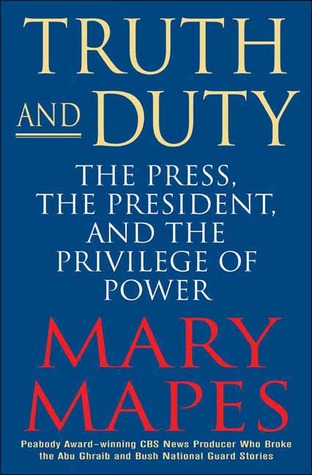 “Truth,” like everything connected to former CBS news producer Mary Mapes these days, has been awash in controversy since its release. About the notorious “60 Minutes II” segment on President George W. Bush’s Texas Air National Guard service, it focuses on the accusations of document forgeries that resulted in Mapes’s termination and longtime news anchor Dan Rather’s resignation. Adapted from Mapes’s memoir, Truth and Duty: The Press, the President and the Privilege of Power, the film takes the firm stance that the news team (all of whom got the sack in one way or another) were unfairly scapegoated by the rabid right and a television network desperately trying to protect its own corporate interests. But as waggish New Yorker critic Anthony Lane wrote, “Call a movie ‘Truth,’ and you’re asking for trouble.”
“Truth,” like everything connected to former CBS news producer Mary Mapes these days, has been awash in controversy since its release. About the notorious “60 Minutes II” segment on President George W. Bush’s Texas Air National Guard service, it focuses on the accusations of document forgeries that resulted in Mapes’s termination and longtime news anchor Dan Rather’s resignation. Adapted from Mapes’s memoir, Truth and Duty: The Press, the President and the Privilege of Power, the film takes the firm stance that the news team (all of whom got the sack in one way or another) were unfairly scapegoated by the rabid right and a television network desperately trying to protect its own corporate interests. But as waggish New Yorker critic Anthony Lane wrote, “Call a movie ‘Truth,’ and you’re asking for trouble.”
Even some members of the allegedly liberal media have taken issue with the film’s unwavering conviction in the reporting of the “60 Minutes II” team. “This is one of the worst films about journalism (and there have been plenty of bad ones) to come down the pike in a long while,” fumed Christopher Orr in The Atlantic. “It loudly, hectoringly stresses the importance of always ‘asking questions’ … yet celebrates in its protagonist that she never questions whether her reporting might have been wrong.” The few positive reviews are studies in faint praise. “On its own terms,” wrote New York Magazine‘s David Edelstein, “‘Truth’ works fine … But having a feeling and having proof are different things.” Other critics (like myself) have bigger problems with the ham-handedness – with how characters speechify rather than speak, as if they’re cogs in an especially ardent position paper. (You stop asking questions, that’s when the American people lose!)
Lost in this fervor is the fact that “Truth” may be the most feminist mainstream film of 2015.
In it, Mapes (Cate Blanchett) is carefully presented as a “good girl” and what used to be called a “company man.” She adores her job and is fiercely loyal to Rather (Robert Redford) and CBS. She is a loving wife and mother. She doesn’t drink excessively or take drugs, at least until she’s under siege.  She is attractive and well-groomed. She is politically unaffiliated. She enjoys the company of men, including Rather and her crack cotillion of mostly male reporters and researchers. Overall, it is safe to say pains are taken to establish that Mapes is not a radical feminist.
She is attractive and well-groomed. She is politically unaffiliated. She enjoys the company of men, including Rather and her crack cotillion of mostly male reporters and researchers. Overall, it is safe to say pains are taken to establish that Mapes is not a radical feminist.
At first, this distinction set me on edge. So what if she was? But as “Truth” progressed, I grasped the advantage of emphasizing Mapes’s conventionality. Here, suggests writer/director James Vanderbilt, is a powerful woman who expects fair treatment from men and women alike, a journalist who believes in the nobility of the media, and a proud American who believes her patriotic duty is to point out what needs correction in this country. In short, here is someone who believes in the system enough to work within it.
Yet she still encounters institutionalized sexism at every turn. Her alcoholic, misogynist father bullies her in the media, which is all too happy to let him upend her authority without considering the source. The tongue-lashing directed at her by bloggers and commentators is jarringly, hatefully gendered. And the “independent” panel assembled by CBS barrages her with thinly veiled accusations that she has allowed her emotions to interfere with her professional distance. The optics of this panel – all male, all white – are striking as Blanchett struggles womanfully to keep her cool lest she be accused of letting those pesky female feelings once again go to her head. (Keep in mind that impassioned speech is the stuff of which fiery male rhetoric has always been made.) It’s hard to watch this scene without flashing on Hillary Clinton at the recent Benghazi hearing: same restraint, same optics. Same sexist double standard.
Aside from being one of the only recent Hollywood movies that centers on a woman doing her job – the traditional way to tell this story would have been to focus on Rather – the primary feminist achievement of “Truth” is that it  highlights a problem still facing most women in the workplace. Here is a profoundly mainstream film that shows that even Mapes, who by all rights was about as “Inside Baseball” as you could get, had to choose between suppression and being dismissed as a dangerously irrational woman. Talk about dismantling the master’s house with his own tools.
highlights a problem still facing most women in the workplace. Here is a profoundly mainstream film that shows that even Mapes, who by all rights was about as “Inside Baseball” as you could get, had to choose between suppression and being dismissed as a dangerously irrational woman. Talk about dismantling the master’s house with his own tools.
This was originally published in Word and Film.
